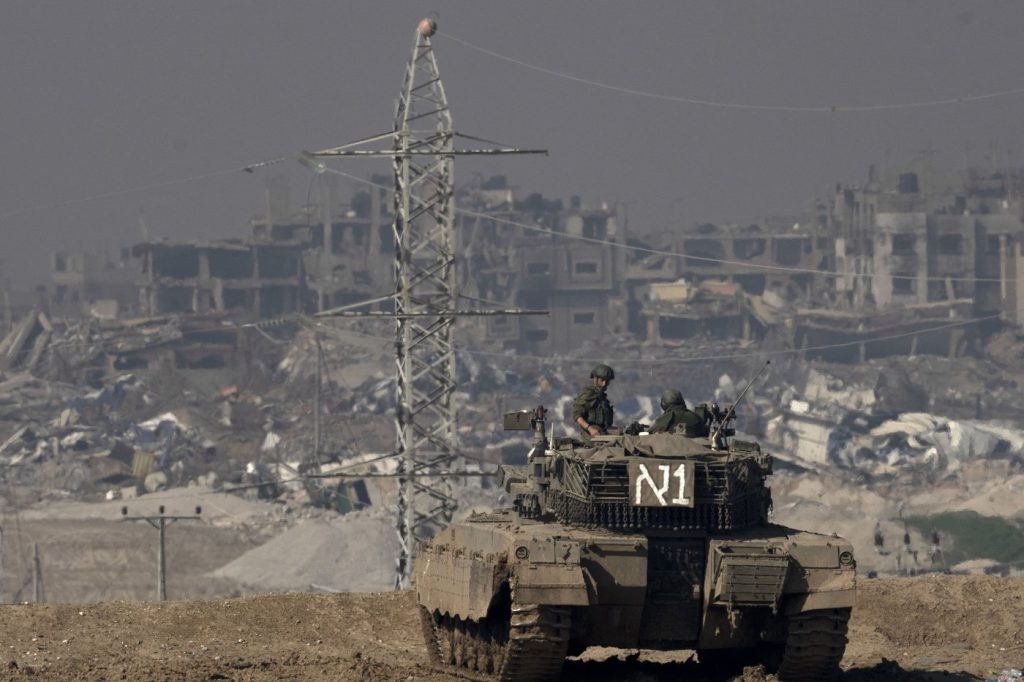JERUSALEM (AP) – Yotam Vilk, an officer in the armored corps, reflects on the haunting image of Israeli soldiers killing an unarmed Palestinian teenager in the Gaza Strip. He recounted that the directives were to shoot anyone who entered an Israeli-controlled buffer zone, claiming he witnessed at least 12 deaths, but the teenager's death remains etched in his memory. Vilk described it as part of a broader narrative where Palestinians were dehumanized, stating, “He died as part of a bigger story. As part of the policy of staying there and not seeing Palestinians as people.”
Vilk is among a growing number of Israeli soldiers speaking out and refusing to continue serving, expressing that they have seen actions that cross ethical boundaries. While the movement is small, with around 200 soldiers signing a letter stating they would cease fighting if the government did not secure a ceasefire, those involved argue that it represents just the beginning of a larger movement. They are calling for others to join in voicing their concerns.
This refusal coincides with increasing pressure on both Israel and Hamas to end the ongoing conflicts. Ceasefire negotiations are currently underway, with influential leaders like President Joe Biden and President-elect Donald Trump urging for a resolution before the January 20 inauguration.
Seven soldiers who have opted out of fighting in Gaza shared their experiences, detailing indiscriminate killings of Palestinians and the destruction of homes. Some reported being ordered to demolish homes that posed no threat and witnessed instances of looting and vandalism among soldiers. Traditionally, soldiers must maintain a political neutrality and seldom publicly oppose army actions. However, since Hamas launched an assault on October 7, 2023, Israeli society has largely rallied around military actions against the group.
Despite the unity, divisions have been growing, with most criticism focusing on the rising number of soldiers killed rather than the military's actions in Gaza. International rights organizations have leveled accusations of war crimes against Israel, claiming genocidal actions in Gaza, while the International Court of Justice investigates genocide allegations from South Africa. Additionally, the International Criminal Court is pursuing the arrests of Israeli officials, including Prime Minister Benjamin Netanyahu.
Israeli officials vehemently refute genocide claims, asserting that they have implemented extensive measures to minimize civilian harm and stating that the army does not intentionally target civilians. They claim to investigate and penalize instances of suspected misconduct internally; however, rights organizations argue that these internal investigations are often insufficient.
The Israeli army has stated that it condemns the refusal to serve and examines each case of refusal on an individual basis. Although refusing to serve can lead to imprisonment, none of the soldiers who signed the letter have faced detention, according to those leading the initiative.
Vilk found himself entering Gaza in November 2023 with a belief that the initial use of force might prompt negotiations. However, he gradually witnessed a degradation of the value placed on human life. He detailed an incident where Israeli troops fired warning shots at a Palestinian teenager, who continued moving toward the buffer zone despite the warnings, leading to his eventual shooting.
Vilk expressed uncertainty about whether individuals were armed in the buffer zone but criticized the rapid actions taken by soldiers. Some soldiers pointed to manipulative tactics by Hamas, suggesting that monetary incentives were offered to encourage civilians into the buffer zone to provoke military responses.
Soldiers like Yuval Green, a medic, reported a deep discomfort with their orders. After witnessing significant destruction and looting, Green abandoned his post in January 2024 due to moral conflict. He described feelings of vindictiveness when ordered to burn down a house, emphasizing that taking more from Palestinians felt unjust. He left his unit prematurely, advocating for a break in the cycle of violence.
The group 'Soldiers for the Hostages,' which organized the letter signed by troops, aims to rally further support and awareness, underscoring the significance of choosing to challenge perceived injustices. Some veterans perceive this open refusal as disrespectful, especially considering the more than 830 Israeli soldiers lost in the conflict. They argue that actions taken against Hamas were necessary and emphasize the importance of military obedience.
While the refusal movement is small, it reflects a broader sentiment among soldiers grappling with moral dilemmas and traumatic experiences from their service. Tuly Flint, a trauma therapist, noted that many soldiers struggle with moral injury, experiencing symptoms like flashbacks and emotional distress after witnessing destruction and loss of life. A former infantry soldier disclosed feelings of guilt regarding unnecessary destruction witnessed during his service, expressing regret and sorrow for involvement in actions he now perceives as war crimes.











